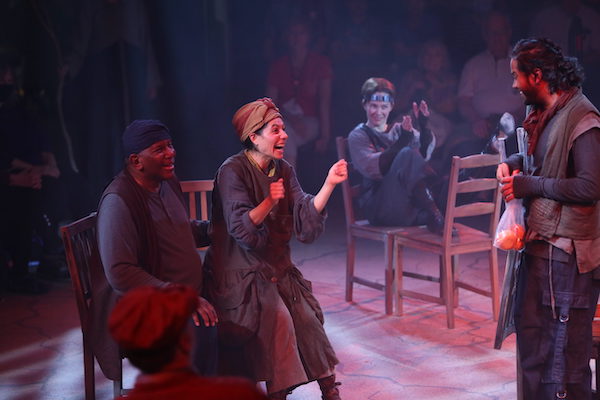Left to right: Tom Pickett, Advah Soudack, Kate Besworth and Karthik Kadam in Bard on the Beach’s production of Shakespeare’s Henry V, which runs to Aug. 13. (photo by Tim Matheson)
Bard on the Beach rarely presents Shakespeare’s history plays. The last time Vancouver audiences were treated to one of the House of Lancaster trilogies was in 2011. Like Julius Caesar, currently playing on the Mainstage, Henry V is a timely production, based on world events. Unlike Julius Caesar, which is set in modern times, director Lois Anderson has envisioned the setting for Henry V as an indeterminate time in a wartorn future.
In Henry V, there is a device Shakespeare often used – a play within a play. A traveling troupe of nine actors, seeking shelter from a raging storm, suitcases in hand, arrives in an apocalyptic time to present their version of Henry V. Their ultimate message: make love, not war.
When Henry IV died, his 16-year-old son, Prince Hal, ascended to the throne of England. His father had, on his deathbed, made it clear to his son that, to take on the crown responsibilities, he had to give up his profligate lifestyle and his association with the lower-class tavern set, including his mentor Falstaff. Once on the throne, and taking government matters seriously, Henry V is surrounded by ambitious advisors who encourage him to invade France as part of the ongoing Hundred Years War between the two countries. Reluctant at first, the arrival of an emissary at his court with a “gift” of tennis balls (analogous to a slap in the face) from the cocky French Prince, the Dauphin, convinces Henry to go to war.
On the battlefield, Henry comes of age, transitioning from an impressionable youth to a fierce leader of men. Although vastly outnumbered, the English are ultimately successful in the 1415 Battle of Agincourt, spurred on by Henry’s rousing now-iconic call to arms: “We few, we happy few, we band of brothers; for he today that sheds his blood with me shall be my brother.”
As part of the boy-to-man transition, Henry takes a hard line with his tavern pals, who have also joined the fight for king and country – condemning one to death for stealing a loaf of bread and eschewing the pleas for reconciliation from a dying Falstaff.
The audience is guided through the story by a narrator, the Chorus, who welcomes us to “the show” and provides numerous asides that give context and meaning to what is happening on stage, both in the action and in Henry’s mind (manifested by flashbacks to his carefree days of youth).
All the cast, save for the eponymous lead, play multiple roles and Anderson has chosen to always keep the actors on stage. When not involved in a scene, they sit off to the side. Costume changes take place right in front of the audience. The intimate Douglas Campbell Theatre allows for this up-close-and-personal action.
The women in this production are standouts. Jewish community member Advah Soudack not only acts, doing double-duty portraying Mistress Quickly (one of the tavern denizens) and the emissary Mountjoy, but also has a chance to show off her vocal skills with a haunting solo. Newcomer Marlee Griffiths is simply delightful as the French princess Katharine, especially as she practises English with her maid. Emilie Leclerc is both the narrator and French Queen Isabelle, and makes her Bard debut with a strong performance.
Kate Besworth plays Henry V in a gender reversal. Anderson’s vision encompasses the insecurity and angst of a teenager suddenly placed in charge of a country at war, who must make decisions with far-reaching consequences. Yet that same youth can be painfully shy when it comes to wooing, winning and wedding Princess Katherine (a strategic alliance that helps broker peace between the warring nations). Diminutive Besworth ably portrays these two sides of Henry’s character.
Among the male actors, Billy Marchenski is a tough Exeter; Craig Erickson, Henry IV; Tom Pickett, the King of France; and Karthik Kadam, the Dauphin. Munish Sharma gets to play with the role of portly Falstaff.
However, the real stars in this rendering are the designers. Kudos to all of them, starting with Jewish community member Amir Ofek in charge of the set design. In the program notes, he writes, “Director Lois Anderson and myself reimagined this production as an immersive audience experience that starts from the moment you enter the performance space.” He certainly accomplished this goal. When you step through the front tent flap, you are transported into a futuristic sepia-and-earth-tone world, chairs haphazardly stacked, looking like they are about to fall over (a metaphor for the chaos of the world), and an inner tent made of burlap sacks stitched together (scavenged from various local coffee shops), all atop a cracked, parched dirt floor. You really do feel like you are in a tent in the middle of a battlefield. The chairs are used to represent everything from beds to thrones to canons to barricades to weapons.
Mara Gottler’s costumes reflect the “anytime and no time” design mandate she was given and lend themselves to the quick on-stage changes. She wanted to “convey a visual narrative of war and love,” and accomplishes this with different colour palettes for the French and English courts and the tavern gang. Sophie Tang’s lighting, together with Joelysa Pankanea’s musical score, complete the effect. Original songs for the troupe add a novel layer to the production and choreographer/fight director Jonathan Hawley Purvis deserves a mention for the clever battle scenes.
Anderson’s vision is certainly a treatise on the evils – and inevitability – of war, yet still holds out a glimmer of hope for redemption through love.
Henry V runs until Aug. 13. For tickets, visit bardonthebeach.org or call the box office, 604-739-0559.
Tova Kornfeld is a Vancouver freelance writer and lawyer.

